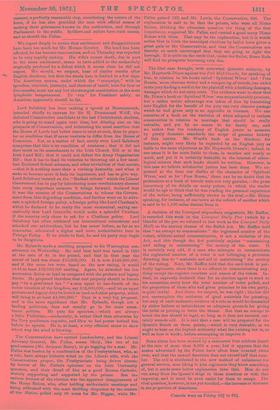The libel case brought, with somewhat Quixotic audacity, by Mr.
Hepworth Dixon against the Pall Mall Gazette, for speaking of him, in relation to his books called Spiritual Wives' and Free Russia,' as an obscene writer and a vamper-up of travels, has ended in the jury finding a verdict for the plaintiff with a farthing damages, damages which do not carry costa. The evidence went to show that Mr. Dixon's book on 'Spiritual Wives' was unquestionably prurient, but a rather unfair advantage was taken of him by translating into English for the benefit of the jury one very obscene passage which he had given only in an appendix in German. We can conceive of a book on the varieties of whim adopted in various communities in relation to marriage that should be really valuable, and yet by no means fit for family use, and we rather fear the tendency of English jurors to measure by purely domestic standards the scope of genuine history of this nature. Mr. Ward's book on the Hindoos, for instance, might very likely be regarded by an English jury as liable to the same objections as Mr. Hepworth Dixon's; indeed, in one sense it is far more liable to them, in another not nearly so much, and yet it is certainly desirable in the interest of ethno- logical science that such books should be written. However, in this ease we believe substantial justice has been done. We ex- pressed at the time our dislike of the character of Spiritual Wives,' and as for 'Free Russia,' there can be no doubt that its pretensions as a book of travels were not very genuine,—the gross inaccuracy of its details on many points, in which the reader would be apt to think that he was reading the personal experience of the writer, being sufficiently shown in the trial,—Mr. Dixon speaking, for instance, of one town as the suburb of another which is said to be 1,100 miles distant from it.


































 Previous page
Previous page